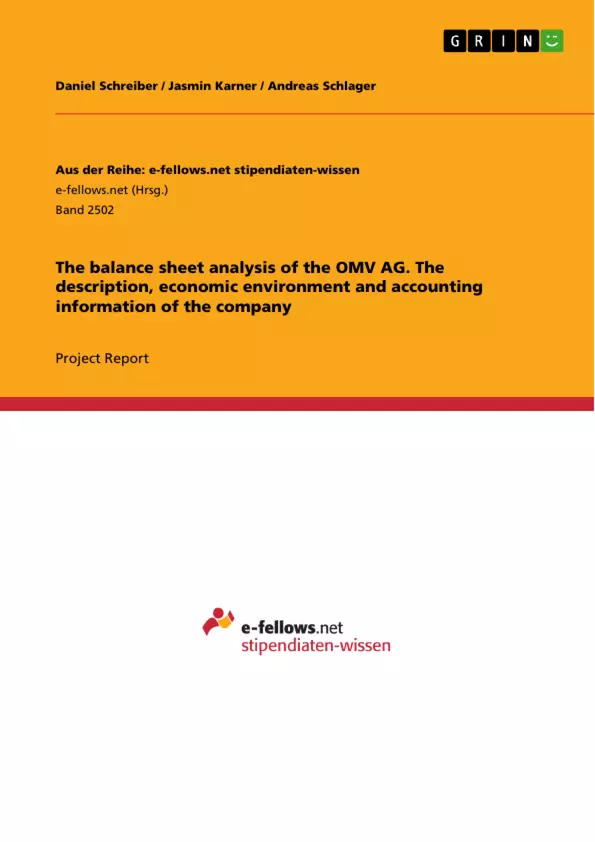The aim of this paper is to discover potential sources and methods how earnings management could happen within OMV.
To discover the methods, the authors will briefly look at the outline of the company and its history. The main part of this work will be dealing with accounting policies of the company as well as the CEO change in 2015. The CEO change will be the focus of our research in discovering potential methods and tools for earnings management.
In detail, the authors will focus our work on the years 2014, 2015 and 2016. All the information will be taken from the official annual reports of OMV, which are all available for the public.
Inhaltsverzeichnis (Table of Contents)
- Introduction.
- Company description
- History of the company.
- Company structure and business areas.
- Owners' structure
- Subsidiaries and shareholdings.
- Economic Environment
- Branch description in general...
- Oil price..........\n
- Gas price......
- Political instability in countries where OMV is involved.
- Gas crisis related to the conflict between Russia and Ukraine......
- Accounting information
- Key accounting policies
- Accounting flexibility
- Likely earnings management motivations....
- Accounting strategy and disclosure quality..\n
- Red flags in the annual report of OMV...
- The use of Impairment and deferred taxes for real earnings management..
- Impairment of “Oil and gas assets\".
- The importance of deferred taxes for real earnings management
- Assets and liabilities held for sale and their effect on earnings
- Misstatements in the annual report of 2014
- Other possible red flags which are an indicator for real earnings management ...
- The use of Impairment and deferred taxes for real earnings management..
- Conclusion and final statement
- Sources
- List of tables.....
Zielsetzung und Themenschwerpunkte (Objectives and Key Themes)
This paper aims to uncover potential sources and methods of earnings management within OMV. The analysis delves into the company's outline, history, and accounting policies, with particular focus on the CEO change in 2015 and its potential impact on earnings management. The research focuses specifically on the years 2014, 2015, and 2016, utilizing data from publicly available OMV annual reports.
- Analysis of OMV's company structure, history, and accounting policies.
- Examination of potential earnings management methods and tools.
- Investigation of the impact of the CEO change in 2015 on earnings management.
- Identification of potential red flags in OMV's annual reports.
- Exploration of the influence of various economic factors, including oil and gas prices, on OMV's operations.
Zusammenfassung der Kapitel (Chapter Summaries)
The introduction outlines the purpose and scope of the research, focusing on uncovering potential earnings management within OMV. The company description provides a comprehensive overview of OMV's history, structure, business areas, and ownership. The Economic Environment chapter examines the industry's vulnerability to volatile oil and gas prices, political instability, and economic events. The Accounting Information chapter delves into OMV's key accounting policies, potential for accounting flexibility, and possible motivations for earnings management. The Red flags in the annual report of OMV chapter analyzes specific areas in the annual report that might indicate earnings management, focusing on the use of Impairment and deferred taxes, as well as other potential red flags.
Schlüsselwörter (Keywords)
Earnings management, OMV, accounting policies, CEO change, red flags, annual reports, oil and gas industry, economic environment, accounting flexibility, impairment, deferred taxes.
Frequently Asked Questions
What is the main focus of the OMV balance sheet analysis?
The study aims to identify potential methods and sources of earnings management within OMV, particularly around the time of the CEO change in 2015.
How can impairment be used for earnings management?
Impairments of oil and gas assets can be used as a tool for "real" earnings management to adjust the reported value of assets and influence net income.
What role do deferred taxes play in OMV's accounting?
Deferred taxes are considered a "red flag" area where management may have flexibility to influence the company's financial results.
Which years were analyzed in this research?
The research focuses specifically on the financial years 2014, 2015, and 2016.
What external factors affect OMV's financial performance?
Volatile oil and gas prices, political instability in regions where OMV operates, and the gas crisis related to the Russia-Ukraine conflict are significant external factors.
- Citation du texte
- Daniel Schreiber (Auteur), Jasmin Karner (Auteur), Andreas Schlager (Auteur), 2017, The balance sheet analysis of the OMV AG. The description, economic environment and accounting information of the company, Munich, GRIN Verlag, https://www.grin.com/document/373554



